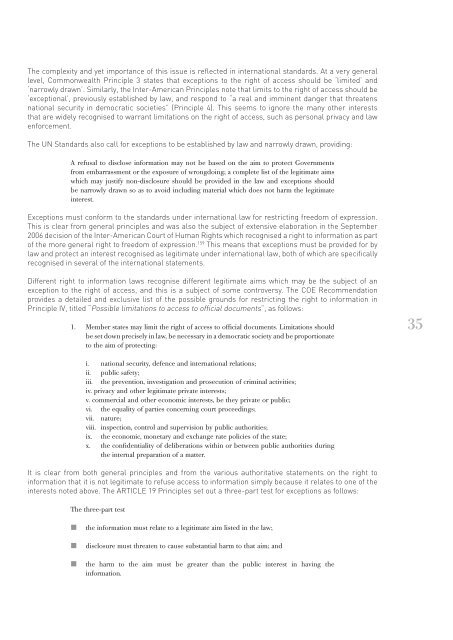Freedom of Information: A Comparative Legal Survey - Federation of ...
Freedom of Information: A Comparative Legal Survey - Federation of ...
Freedom of Information: A Comparative Legal Survey - Federation of ...
You also want an ePaper? Increase the reach of your titles
YUMPU automatically turns print PDFs into web optimized ePapers that Google loves.
The complexity and yet importance <strong>of</strong> this issue is refl ected in international standards. At a very general<br />
level, Commonwealth Principle 3 states that exceptions to the right <strong>of</strong> access should be ‘limited’ and<br />
‘narrowly drawn’. Similarly, the Inter-American Principles note that limits to the right <strong>of</strong> access should be<br />
‘exceptional’, previously established by law, and respond to “a real and imminent danger that threatens<br />
national security in democratic societies” (Principle 4). This seems to ignore the many other interests<br />
that are widely recognised to warrant limitations on the right <strong>of</strong> access, such as personal privacy and law<br />
enforcement.<br />
The UN Standards also call for exceptions to be established by law and narrowly drawn, providing:<br />
A refusal to disclose information may not be based on the aim to protect Governments<br />
from embarrassment or the exposure <strong>of</strong> wrongdoing; a complete list <strong>of</strong> the legitimate aims<br />
which may justify non-disclosure should be provided in the law and exceptions should<br />
be narrowly drawn so as to avoid including material which does not harm the legitimate<br />
interest.<br />
Exceptions must conform to the standards under international law for restricting freedom <strong>of</strong> expression.<br />
This is clear from general principles and was also the subject <strong>of</strong> extensive elaboration in the September<br />
2006 decision <strong>of</strong> the Inter-American Court <strong>of</strong> Human Rights which recognised a right to information as part<br />
<strong>of</strong> the more general right to freedom <strong>of</strong> expression. 159 This means that exceptions must be provided for by<br />
law and protect an interest recognised as legitimate under international law, both <strong>of</strong> which are specifi cally<br />
recognised in several <strong>of</strong> the international statements.<br />
Different right to information laws recognise different legitimate aims which may be the subject <strong>of</strong> an<br />
exception to the right <strong>of</strong> access, and this is a subject <strong>of</strong> some controversy. The COE Recommendation<br />
provides a detailed and exclusive list <strong>of</strong> the possible grounds for restricting the right to information in<br />
Principle IV, titled “Possible limitations to access to <strong>of</strong>fi cial documents”, as follows:<br />
1. Member states may limit the right <strong>of</strong> access to <strong>of</strong>fi cial documents. Limitations should<br />
be set down precisely in law, be necessary in a democratic society and be proportionate<br />
to the aim <strong>of</strong> protecting:<br />
i. national security, defence and international relations;<br />
ii. public safety;<br />
iii. the prevention, investigation and prosecution <strong>of</strong> criminal activities;<br />
iv. privacy and other legitimate private interests;<br />
v. commercial and other economic interests, be they private or public;<br />
vi. the equality <strong>of</strong> parties concerning court proceedings;<br />
vii. nature;<br />
viii. inspection, control and supervision by public authorities;<br />
ix. the economic, monetary and exchange rate policies <strong>of</strong> the state;<br />
x. the confi dentiality <strong>of</strong> deliberations within or between public authorities during<br />
the internal preparation <strong>of</strong> a matter.<br />
It is clear from both general principles and from the various authoritative statements on the right to<br />
information that it is not legitimate to refuse access to information simply because it relates to one <strong>of</strong> the<br />
interests noted above. The ARTICLE 19 Principles set out a three-part test for exceptions as follows:<br />
The three-part test<br />
the information must relate to a legitimate aim listed in the law;<br />
disclosure must threaten to cause substantial harm to that aim; and<br />
the harm to the aim must be greater than the public interest in having the<br />
information.<br />
35
















